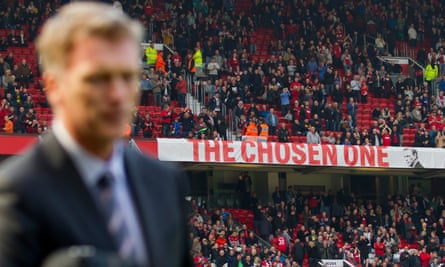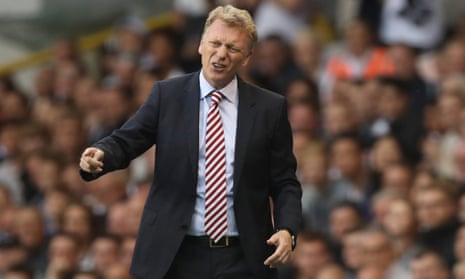David Moyes saw it as the high-point of his managerial career when chosen to succeed Sir Alex Ferguson at Manchester United by the man himself. He could never have imagined it would be the turning point, or that a reputation built so carefully could unravel so quickly.
Since swapping the comforts of Everton for a six-year contract at Old Trafford in May 2013, departing Goodison Park to a standing ovation no less, Moyes has been sacked by two clubs and resigned from the one with whom he suffered the first relegation of his career. It may reflect well on the 54-year-old that he has left Sunderland without compensation for the final three years of his contract, but it reflects a truly dismal spell at the Stadium of Light that the clean break will be a mere footnote in Moyes’s time at the club. A Football Association charge for threatening to slap BBC Newcastle and Radio Five Live reporter Vicki Sparks, six wins in 38 Premier League games and pandering to John Terry’s ego at Chelsea on the final day of the season will be more defining memories for the Sunderland support.
Ten months at United, one year at Real Sociedad and 10 months on Wearside: the stability that Moyes gave to Everton – and vice versa – is now the exception to his career at the highest level when, as the United contract demonstrated, it had seemed the norm only four years ago. Change has not been confined to results since Ferguson summonsed his fellow Glaswegian to his home and offered, no, bestowed on Moyes the job of replacing a legend, a task he appeared unsuited for from the start. The Scot has faced constant calls for his dismissal from Sunderland supporters during the final months of a season that delivered the relegation the club have flirted with for several years. It will have hurt Moyes to hear demands for his head every time he set foot in his technical area but, tellingly, financial constraints are believed to be behind his resignation ahead of a season spent fighting in the Championship, not external pressure.

Moyes might have felt he had to quit before, with little money to spend and his few productive players such as Jordan Pickford and Jermain Defoe destined to leave this summer, his return as Sunderland manager looked even worse. Instead, however, it is a decision that strengthens the suspicion Moyes has lost some of his fight, his confidence and his clear convictions on how to develop a team for the long term since walking into a dressing room of champions at United and encountering open hostility. Moyes was accused of being aloof and arrogant during his 12 months at Real Sociedad, criticism that would not have been said of him prior to being chosen by Ferguson, while Fabio Borini’s admission that the Sunderland squad was divided invited fresh questions about his man-management skills.
A catalogue of injuries and the timing of Moyes’s arrival as Sam Allardyce’s replacement last summer contributed to Sunderland’s problems this season but his signings, tactics and motivational woes were equally significant. In many respects he resembled the right fit for Sunderland given what he achieved with time, patience and boardroom support at Everton but Ellis Short’s seventh manager in five years did not help himself with talk of a relegation fight two games into the season. What Moyes saw as brutal honesty was perceived by others as unnecessary negativity, and the image proved impossible to shake. A mid-season break to New York that preceded another miserable run of form and turning to a host of former, ageing Everton players to improve Sunderland’s survival prospects added to supporters’ dismay.
Moyes was not the first Sunderland manager to discover his transfer budget was not as large as it had appeared during talks with the club’s hierarchy. Allardyce, while feted for dragging the club to safety before landing the England job, also quickly took issue with the financial situation at Sunderland and allegedly thought it 50% less than he had been led to believe. By getting out now Moyes may feel he has an opportunity to start afresh and with the long-term outlook that suits him elsewhere. But after the experiences of United, Sociedad and now Sunderland that is a risk.
His options at the highest level will have suffered as a consequence of this season and his diminishing returns, although the Scotland job remains a likely alternative once Gordon Strachan’s time is up. Time out to reflect on the downward trajectory of his career, to rediscover the drive and ambition that characterised his arrival in the Premier League, is in order.

Comments (…)
Sign in or create your Guardian account to join the discussion